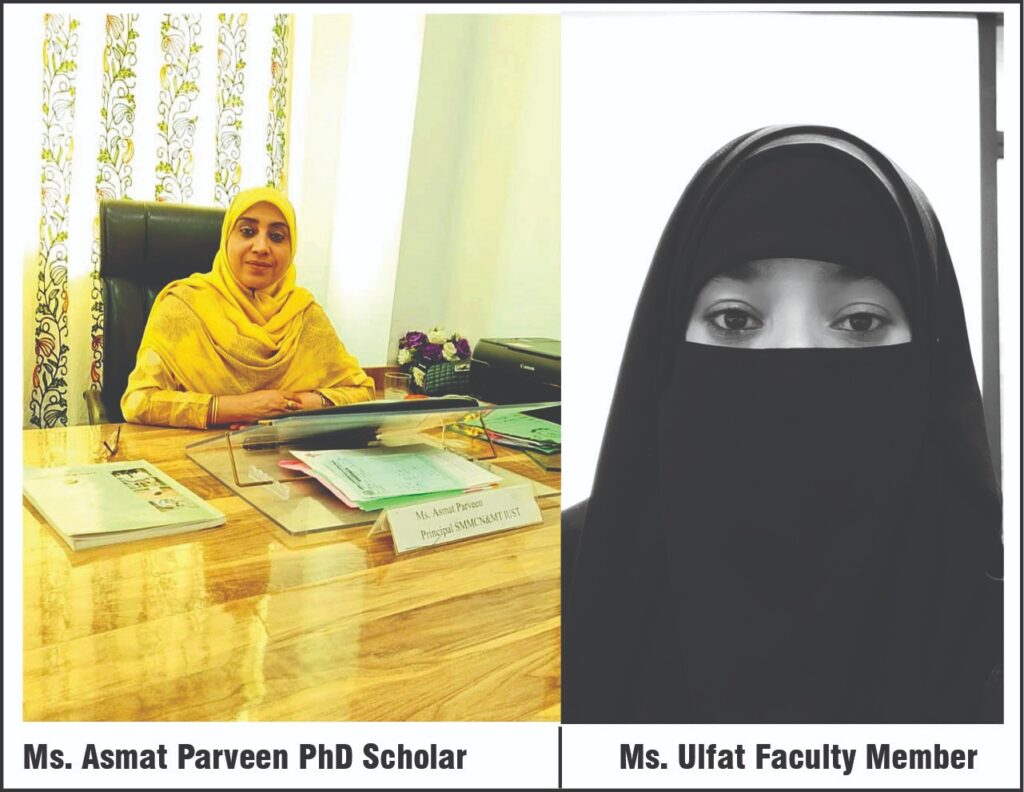Nasir Ali

Ms. Asmat parveen, the visionary behind the groundbreaking research on respiratory health in kashmir’s brick kiln workers and residents, shares insights into her work and its implications
Q: WHAT RECENT RECOGNITION HAVE YOU RECEIVED FOR YOUR RESEARCH PROPOSAL, AND WHAT DOES THIS ACKNOWLEDGMENT SIGNIFY?
A: In a momentous stride towards addressing one of Kashmir’s most pressing public health concerns, the Indian Council of Medical Research (ICMR) has bestowed distinguished recognition upon me I, Asmat Parveen a PhD scholar hailing from Ambala, Haryana, and Founder principal Nursing colleges IUST Awantipora Kashmir, along Ms. Ulfat, a pioneering figure in the nursing domain, for our ground breaking research proposal titled “UNVEILING THE HIDDEN THREAT: RESPIRATORY HEALTH IN KASHMIR’S BRICK KILN WORKERS AND RESIDENTS.” This significant accolade underscores not only the commitment and ingenuity of Ms. Parveen and her esteemed faculty but also heralds a pivotal step towards understanding and mitigating the complex challenges of respiratory health in the region.
Q: WHAT SPECIFIC OBJECTIVES ARE AT THE CORE OF MS. PARVEEN AND MS. ULFAT’S RESEARCH PROPOSAL, AND WHY IS IT CONSIDERED URGENT?
A: Nestled amidst the breath taking landscapes of Kashmir lies a silent, yet pervasive threat – the adverse effects of industrial activities on respiratory well-being. Against this backdrop, I and my faculty Ms Ulfat meticulously crafted proposal seeks to unravel the intricate relationship between air pollution and respiratory health among brick kiln workers and local residents. The urgency of this inquiry cannot be overstated, as the prevalence of chronic respiratory illnesses continues to exact a toll on the populace, warranting immediate attention and decisive action.
At the heart of researcher’s proposal lies a multifaceted approach aimed at achieving several critical objectives. Foremost among these is the determination of respiratory health patterns through a comprehensive evaluation. By assessing the prevalence of chronic respiratory illnesses and lung function among Kashmiri adults, the research endeavours to furnish invaluable insights into the magnitude and nature of respiratory health challenges confronting the region. Moreover, through a comparative analysis of brick kiln workers and local inhabitants vis-à-vis the general population, the study promises to shed light on the distinct impact of occupational and environmental factors on respiratory health outcomes.
Q: COULD YOU ELABORATE ON THE METHODOLOGY CENTRAL RESEARCH PROPOSAL, AND HOW DOES IT ENSURE A COMPREHENSIVE UNDERSTANDING OF RESPIRATORY HEALTH IN KASHMIR?
A: Central to the research’s methodology is a rigorous, multi-stage cross-sectional prevalence study spanning diverse districts in Kashmir. Employing random sampling techniques ensures the representation of varied settings, including brick kilns and local communities, thereby offering a holistic perspective of the respiratory health landscape. This meticulous approach not only enhances the robustness of the findings but also underscores the commitment to inclusivity and equity in research endeavours.
Q: HOW DO YOU ENVISION THE GLOBAL IMPACT OF YOUR RESEARCH BEYOND KASHMIR, PARTICULARLY IN INFORMING POLICYMAKERS AND PUBLIC HEALTH EXPERTS WORLDWIDE?
A: Beyond its immediate implications for Kashmir, Ms. Asmat Praveen’s and her faculty Ms Ulfat’s research holds reverberations on a global scale. By elucidating the intricate nexus between air pollution and respiratory health, her findings stand poised to inform policymakers and public health experts worldwide. From the formulation of targeted interventions to the empowerment of vulnerable communities, the implications of this research are far-reaching and transformative.
Furthermore, against the backdrop of the ongoing COVID-19 pandemic, the significance of researcher’s inquiry is amplified. Preliminary evidence suggests a correlation between exposure to air pollutants and the exacerbation of respiratory illnesses, including COVID-19. Armed with this understanding, communities can proactively fortify themselves against the virus and its potential ramifications, thereby safeguarding public health and well-being.
As me and my esteemed faculty embark on this vital research endeavour, a resounding call to action reverberates across Kashmir and beyond. From the implementation of stringent regulations governing industrial emissions to grassroots initiatives promoting clean air, concerted efforts are imperative in safeguarding the health and vitality of Kashmiri residents. Moreover, the recognition accorded by the ICMR, marking the first instance of a high grant awarded in the nursing discipline in India, serves as a testament to the untapped potential of nursing professionals.
Indeed, as Ms. Praveen’s trailblazing work exemplifies, nursing professionals possess the capacity to transcend traditional boundaries, catalysing positive change and ushering in a healthier future for all, and her faculty’s research epitomizes the transformative power of scientific inquiry and underscores the critical role of interdisciplinary collaboration in addressing complex public health challenges. Through her pioneering efforts, a beacon of hope is kindled, illuminating the path towards a healthier, more resilient future for Kashmir and beyond.



